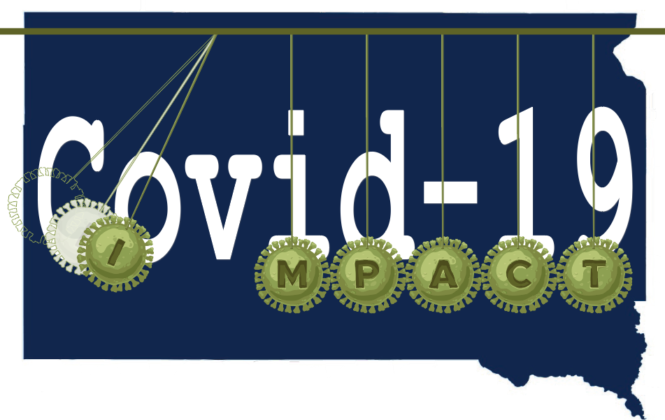The Joint Health and Human Service Committee met on September 22, to consider testimony related to the use of CARES Act Coronavirus Relief Fund (CRF) dollars appropriated to the state. The committee reviewed the federal guidelines for CRF as well as the Small Business Grant and Community Based Healthcare Grant framework proposed by Governor Noem and recommendations to the framework considered by Joint Appropriations before opening up the hearing to public testimony. The committee divided public testimony into three areas:
- Long Term Care: Testimony started with a nursing facility administrator, advocates, and family members of individuals residing in long term care who discussed the emotional toll of COVID-19 visitation regulations and isolation on residents and family members. Individuals emphasized the need for rapid point of care testing devices to make it easier for visitation to occur safely in facilities. Tammy Hatting testified on behalf of SDAHO and spoke about the burden of new federal regulations on facility and the added costs for facilities who are already experiencing decreased census resulting in revenue losses. Hatting emphasized ongoing needs for PPE, mandatory staff testing, staffing and staff turnover and fatigue resulting in increased costs of approximately $50 per bed per day for facilities already operating on thin margins. SDAHO requested $35 million for long term care providers for September through December 30 to address ongoing costs. SDHCA also testified about costs and regulations. The committee discussion and questions were centered around addressing isolation concerns and the regulatory burden on facilities in order to ensure positive outcomes for residents.
- Community Support Providers: The CSP Association and several providers testified regarding lost revenue and increased expenses due to COVID and drew parallels between the isolation experience in long term care and similar situations in community support provider settings. Their testimony focused heavily on workforce recruitment challenges that have been exacerbated by COVID-19 and the economic conditions created by the pandemic. The CSPs noted the enhanced FMAP and opportunities to use the enhanced FMAP to increase provider rates during COVID-19 to assist struggling providers.
- Other Healthcare Providers and Human Service Providers: Tim Rave testified on behalf of SDAHO about the ongoing impact of COVID-19 on health systems and hospitals. He indicated that while federal stimulus dollars distributed to hospitals have helped address the crisis, the lack of preventive and elective care during COVID-19 left hospitals, especially PPS hospitals, with reductions in revenue that necessitated difficult decisions including reduced hours, furloughs and hiring freezes that will have a long term impact. Rave indicated that needs in PPE, equipment, staff testing, and increased expenses totals approximately $30 million across the state for the remainder of 2020 that is not accounted for in the Governor’s proposed Community Based Healthcare Grant framework. Austin Willuweit, Mitch Rave, and Deb Fischer-Clemens testified on behalf of Monument, Sanford, and Avera respectively and shared similar messages about the affect on their health systems and examples of costs contributing to the $30 million needed statewide. Other provider groups also testified about their needs. The Community Health Association of the Dakotas requested that non-profits be included in the Small Business Grant framework and encouraged investing in COVID testing across the state and preparation for vaccine distribution and funding for future vaccine administration. Terry Dosch testified on behalf of Community Mental Health Centers and Substance Use Disorder facilities about the ongoing need for PPE as business operations return to in-person counseling and the need for rapid point of care testing devices for their facilities. Other individuals shared testimony accounting for needs with non-profit food distribution entities, and community programs to address mental health needs of children and teens in the community.
After the conclusion of public testimony, the committee reviewed motions related to topics heard during the hearing, resulting in the following formal recommendations to the Joint Committee on Appropriations:
- Committee support of the $100 million Community Based Provider Grant framework developed by Governor Noem.
- $35 million to be made available to long term care facilities for expenses and losses incurred from September to December 2020.
- $15 million to address isolation and encourage visitation in long term care facilities and community support providers.
- $30 million to be made available to healthcare systems and hospitals for expenses and losses incurred from September to December 2020.
- $15 million for housing assistance programs.
- $3 million for non-profit food distribution programs.
- $300,000 for expanding the 211 Text for Hope program to address mental health needs for youth.
The committee also made several addition recommendations including that every effort be made to translate COVID-19 materials into other languages to ensure messages reach minority citizens, that the JCA review the 6.2% FMAP increase in the Medicaid Program implemented under the CARES Act and associated general fund savings that could be directed to support providers, and that year-end reversion dollars be considered to support equipment purchases for law enforcement utilizing remote mental health crisis telehealth technology.
An audio recording of the hearing is available here.




